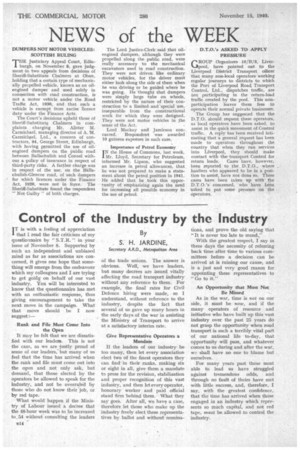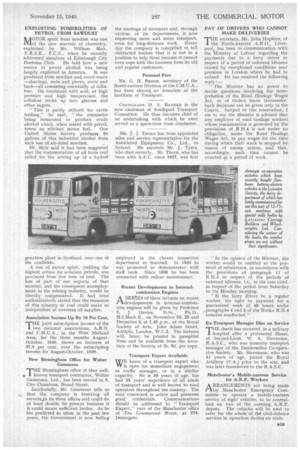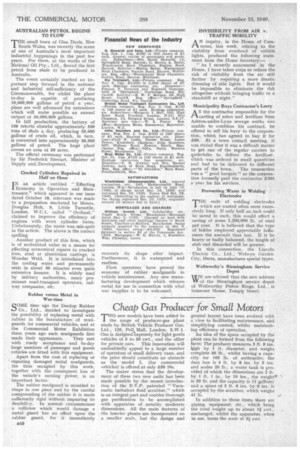NEWS of the WEEK
Page 20

Page 21

Page 22

If you've noticed an error in this article please click here to report it so we can fix it.
DUMPERS NOT MOTOR VEHICLES: SCOTTISH RULING
T"Justiciary Appeal Court, Edinburgh, on November 8, gave judgment in two appeals from decisions of Sheriff-Substitute Chalmers at Oban, holding that a certain type of mechanically propelled vehicle, known as an oilengined dumper and used solely in connection with road construction, is not a motor vehicle under the Road Traffic Act, 1930, and that such a vehicle is exempt from excise licence duty under the Finance Acts.
The Court's decisions upheld those of Sheriff-Substitute Chalmers in complaints charging Mr. Alister M. Carmichael, managing director of A. M. Carmithael, Ltd., a concern of contractors, 94, George Street, Edinburgh, with having permitted the use of oilengined dumpers on the public road between Baliachulish and Cannel without a -policy of insurance in respect of third-party risks. A further charge was in respect of the use, on the Ballachulish-Glencoe road, of such dumpers for which licences under the Finance Act, 1920, were not in force. The Sheriff-Substitute found the respondent " Not Guilty " of both charges. The Lord Justice-Clerkisaid that oilengined dumpers, although they were propelled along the public road, were really accessory to the mechanical excavators used in road construction. They were not driven like ordinary motor vehicles, for the driver must either look along the side of them when he was driving or be guided where he was going. He thought that dumpers were simply large tubs on wheels, restricted by the nature of their construction to a limited and 'special use, inseparable from the constructional work for which they were designed. They were not motor vehicles in the sense of the Act. • Lord Mackay and Jamieson con cursed, Respondent was awarded 10 guineas expenses in each case.
Importance of Petrol Economy
I N the House of Commons, last week, Mr. Lloyd, Secretary for Petroleum, informed Mr. Lipson, who suggested an increase in petrol allowances, that he was not prepared to make a statement about the petrol position in 1941. He added that he took this opportunity of emphasizing again the need for increasing all possible economy in the use of petrol.
D.T.O.'s ASKED TO APPLY PRESSURE
GROUP Organizers 10/B13, Liverpool, have pointed out to the Liverpool District Transport• officer that many non-local operators working regular journeys to districts to which the Port of Liverpool Road Transport Control, Ltd., dispatches traffic, are not participating in the return-load traffic created by the pool. This nonparticipation leaves them free to operate their normal private businesses.
The Group has suggested that the D.T.O. should request these operators, as local operators have been asked, to assist in the quick movement of Control traffic. A, reply has been received intimating that a general request has been made to operators throughout the country that when they run services into Liverpool, they should make contact with• the, transport Control for
return loads. Cases have, however, been reported to the D.T.O., where hauliers who appeared to be in a position to assist, have not done so. These cases have been taken up with the D.T.O.'s concerned, who have been asked to put some pressure on the operators. EXPLOITING POSSIBILITIES OF PETROL FROM SAWDUST
MOTOR spirit from sawdust was one of the new marvels of chemistry, explained by Mr. William Mair, F.R.S.E., F.C.S., when he recently addressed members of Edinburgh City
Business Club. He told how a new source of power alcohol was being largely exploited in America. It was produced from sawdust and wood-waste —shavings, ends and pieces, roots and bark—all consisting essentially of Cellalose. On treatment with acid, at high pressure and high temperature, the cellulose broke up into glucose and other sugars, " This is partly utilized for cattle feeding," he said!, " the remainder being fermented to produce crude alcohol which, when mixed with petrol,
formsan efficient motor fuel. One United States factory produces 20 gallons of this industrial alcohol from each ton of air-dried sawdust.
Mr. Mair said it had been suggested that the transmutation of oil from coal called for the setting up of a hydro* genation plant in Scotland, near one of the coalfields.
A ton of motor spirit, yielding the highest octane for aviation petrols, was produced from five tons of coal. The loss of part of our exports of that mineral, and the consequent unemployment in the mining industry, would be thereby compensated. It had been authoritatively stated that the resources of this country in coal could make us independent of overseas Oil supplies.
Association Income Up By 38 Per Cent.
THE joint subscription income of the two national associations, A.R.O. and C.M.U.A., in the West Midland Area, for the. three months AugustOctober, 1940, shows an increase of 37.9 .per cent, over the subscription income for August-October, 1939.. .
New Birmingham Office for Walter Gammons
HE Birmingham office of that well• 1 known transport contractor, Walter .Gammons, Ltd., has been moved to 8, City Chambers, Broad Street. Incidentally, Mr. Gammons tells us ;. that the company is breaking all recordsn its three offices and could do at least double its present business if it could secure sufficient lorries. Ashe has predicted so often in the past few years, the Government is now feeling
the shortage of transport and, through various of its departments, is now requesting more and more transport, even for long-distance work. Every day the company is compelled to tell distracted traders that it is not in a position to help them because it cannot even cope with the business from its old and regular customers.
Personal Pars M. G. H. Buocue, secretary of the North-eastern Division of the C.M.U.A., has been elected an Associate of •the Institute of Transport.
COUNCILLOR H. S. BANNER IS the new chairman of Southport Transport Committee. He thus becomes chief of an undertaking with which he once served as a spare-time tram cOnductor.
MR. J. J. THORN has been appointed sales and service representative for the Associated Equipment Co., Ltd., in Ireland. He succeeds Mr. J. Tyers, who died recently. Mr. Thorn, who has been with A.E.C. since 1927, was first employed in the chassis inspection department at Southall. In 1933 he was promoted to demonstrator with staff rank. Since 1938 he has been connected with railcar maintenance.
Recent Developments in Internalcombustion Engines ASERIES'of three lectures on recent developments in internal-combustion engines will be given by Professor S. J. Davies, D.Sc., Ph.D., M.I.Mech.E., on November 18, 25 and December 2, at 1.45 p.m., at the Royal Society of Arts, John Adam Street, Adelphi, London, W.C,2. The lectures will, later, be printed in pamphlet form and be available from the secretary of the Society at 2s. 6d, per copy.
Transport Expert Available
WE know of a transport expert who is open for immediate engagement as traffic manager, or in a similar capacity. He is 50 yearS of age, has had 25 years' experience of all kinds of transport and is well known to road operators throughout the country. The man concerned is active and possesses good credentials. Communications should be addressed to " Transport Expert," care of the Manchester office of The Commercial Motor, at 274, Deansgate,
PAY OF DRIVERS WHO CANNOT MAKE DELIVERIES 'THE secretary, Mr. John Hopkins, of J. the North-western A.R.O., Liverpool, has been in communication with the Ministry of Labour regarding the payments due to a lorry driver in respect of a period of enforced idleness caused by exceptional conditions near premises in London where he had to unload. He has received the following reply:— " The Minister has no power to decide questions involving the interpretation of the Road Haulage Wages Act, or of Orders made thereunder. Such decisions can be given only in the Courts. Subject to this reservation, I am to say the Minister is advised that any employer of road haulage workers whose remuneration is governed by the provisions of R.H.4 is not under an obligation, under the Road Haulage Wages Act, to pay wages for the time during which their work is stopped by reason of enemy action, and that, accordingly, such time cannot be counted as a period of work.
" In the opinion of the Minister, the worker would be entitled to the payment of subsistence, in accordance with the provisions of paragraph 11 of R.H.4 in respect of the periods of enforced idleness, i.e., in the case cited, in respect of the period from Saturday to the Monday moruing.
" If the lorry driver be a regular worker, his right to payment for a guaranteed week of 48 hours under ,paragraphs 4 and 5 of the Notice R.11.4 remains unaffected."
Ex-Transport Manager Dies on Service
THE death has occurred, in a military hospital after a protracted illness, of Second-Lieut. W. A. Stevenson, R.A.S.C., who was formerly transport manager of the Dunfermline Co-operative Society. Mr. Stevenson, who was . 41 years of age, joined the Royal Artillery (T.A.) prior to the war, and was later transferred to the R.A.S.C.
Manchester's Mobile-canteen Servke for A.R.P. Workers
ARR_ANGEMENTS are being made by Manchester Emergency Committee to operate a mobile-canteen service of eight vehicles, to be centralized on two of the existing, A.R.P. depots. The vehicles will be used to cater for the whole of the civil-defence services in operation during air raids.
AUSTRALIAN PETROL BEGINS TO FLOW
THE small town of Glen Davis, New South Wales, was recently the scene of one of Australia's most important industrial , happenings in the past few
years. For there, at the works of the National Oil Pty., Ltd., flowed the first petrol from shale to be produced in Australia.
The event certainly marked an important step forward in the national and industrial self-sufficiency of the Commonwealth, for whilst the plant to-day is capable of producing 10,000,000 gallons of petrol a year, plans are well advanced for extensions which will make possible an annual output of 30,000,000 gallons.
In fall production, the battery of 108 retcrts absorbs approximately 500 tons of shale a day, producing 58,000 gallons of crude oil, which, in turn, is converted into approximately 35,000 gallons of petrol. The huge plant covers an area of 50 acres.
The official ceremony was performed by Sir :Frederick Stewart, Minister of Supply .and;Development.
Cracked Cylinders Repaired in Half an Hour I N an article entitled " Effecting Econcrny in Operation and Maintenance,' which appeared in our issue dated October 18, reference was made to a preparation marketed by Messrs. Douglas Holt, 9, Little Turnstile, London. W.C.1, called " Ovrhaul," claimed to improve the efficiency of engines with worn cylinder bores. Unfortunately, the name was mis-spelt in the article. The above is the correct spelling.
Another product of this firm, which is of undoubted value as a means for effecting ecbnomical repairs to cracked iron, steel or aluminium castings, is Wondar Weld. It is introduced into the cooling water and permanently seals in about 30 minutes even quite extensive fissures. It is widely used by military authorities, many prominent road-transport operators, railway companies, etc.
Rubber versus Metal in War-time
SOME time ago the Dunlop Rubber Co., Ltd., decided to investigate the possibility of replacing metal with rubber in the manufacture of mudguards for commercial vehicles, and at the Commercial Motor Exhibition three years ago such mudguards first made their appearance. • They met with ready acceptance and to-day large numbers of passenger and goods vehicles ate fitted with this equipment.
Apart from the cost of replacing or ' repairing damaged metal mudguards, the time occupied by this work, together with the consequent loss of the vehicle's earning power, is an important factor.
The rubber mudguard is moulded to shape in one piece and by the careful compounding of the rubber it is made sufficiently rigid without impairing its flexibili:y. In normal• circumstances a collision which would damage a metal guard has no effect upon the rubber guard, for it immediately recovers its shape after impact. Furthermore, it is waterproof and rustless.
Fleet operators 'have proved the economy of rubber mudguards in vehicle maintenance. Any new manufacturing development which releases metal, for use in connection with vital war supplies is to be welcomed. INVISIBILITY FROM AIR v.
TRAFFIC MOBILITY
AN inquiry, in the House of Commons, last week, relating to the visibility from overhead of vehicle lights, produced the following statement from the Home Secretary:—
" As I recently announced in the House, I have taken steps to reduce the risk of visibility from the air still further by requiring a more drastic dimming of side lights. But it would be impossible to eliminate the risk altogether without bringing traffic to a standstill at night."
Municipality Buys Contractor's Lorry
AS the contractor responsible for the carting of ashes and fertilizer from Ashton-under-Lyne sewage works was unable to continue his contract, he offered to sell his lorry to the corporation, which has agreed to buy it for £60. At a town council meeting, it was stated that it was a difficult matter to get one of the regular carriers to indertake to deliver the fertilizer, which was ordered in small quantities and had to he delivered to different parts of the town. The transaction was a "good bargain" as the corporation formerly paid the contractor 2200 a year for his services.
Preventing Waste in Welding Electrodes
THE ends of welding' electrodes which are wasted often seem excessively long. If only half an inch could be saved in each, this would effect a saving of some 1,200,000 lb. of steel pet year. It is believed that the type of holder employed appreciably influences the amount thus lost. If it be heavy or badly balanced, the length of stub end discarded will be greater.
In this connection, the Lincoln Electric Co., Ltd., Welwyn Garden City, Hefts, manufactures special types.
Wellworthy's Birmingham Service Depot
WE are advised that the new address of the Birmingham service depot of Wellworthy Piston Rings, Ltd., is Somerset House, Temple Street.




























































